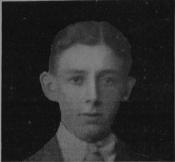
|
ArchiestownWar Records |
| Surgeon (Probationer) William Swirles ALLARDYCE RN | |
|
HMS Negro, Royal Navy Date of birth: 5th April 1897 Date of death: 21st December 1916 Killed in action aged 19 Commemorated Chatham Naval Memorial Panel 20 |

|
| William Swirles Allardyce was born at 47 Lower Beechwood Avenue, Rathmines in Dublin on the 5th of April 1897 the second son of George Allardyce, a tailor's cutter, and Janet (nee Swirles) Allardyce of Viewmount, Archiestown, later of Advie, 65 Grosvenor Road, Rathgar in Dublin He was educated at St Andrew's College, Booterstown in Dublin and, in January 1914 he passed into Trinity College, Dublin at the age of 16 where his tutor was Mr. Tate. On the outbreak of war he left university and entered the Navy before completing his medical training which gave him the rank of Probationer Surgeon. On the night of the 21st of December 1916 the Parker Class flotilla leader HMS Hoste, under the command of Commander Graham Richard Leicester Edwards RN, was escorting the Grand Fleet in a sweep of the North Sea when her steering engine failed. The crew managed to make temporary repairs and she was ordered to return to Scapa Flow to undergo full repairs. She was to be escorted by the destroyer HMS Negro, under the command of Lieutenant Commander Alexander Hugh Gye RN, during her return to base. As the journey progressed the weather worsened and her steering failed again causing her to turn sharply to starboard. HMS Negro was only four hundred yards behind her and was unable to avoid a collision and ran into her aft. The impact of the collision caused two of Hoste's depth charges to come loose and these exploded, causing serious damage to her and blowing a hole in the underside of Negro, flooding her engine room and causing her to sink quickly with the loss of five officers and forty six ratings. HMS Hoste was taken under tow by fellow destroyers HMS Marvel and HMS Marmion but after three hours the damage to HMS Hoste was so extensive that she began to break in half and she too sank with the loss of four ratings. He is commemorated on war memorial at St Andrew's College and on the memorial at Trinity College, Dublin. |
|
| Archiestown |
Back